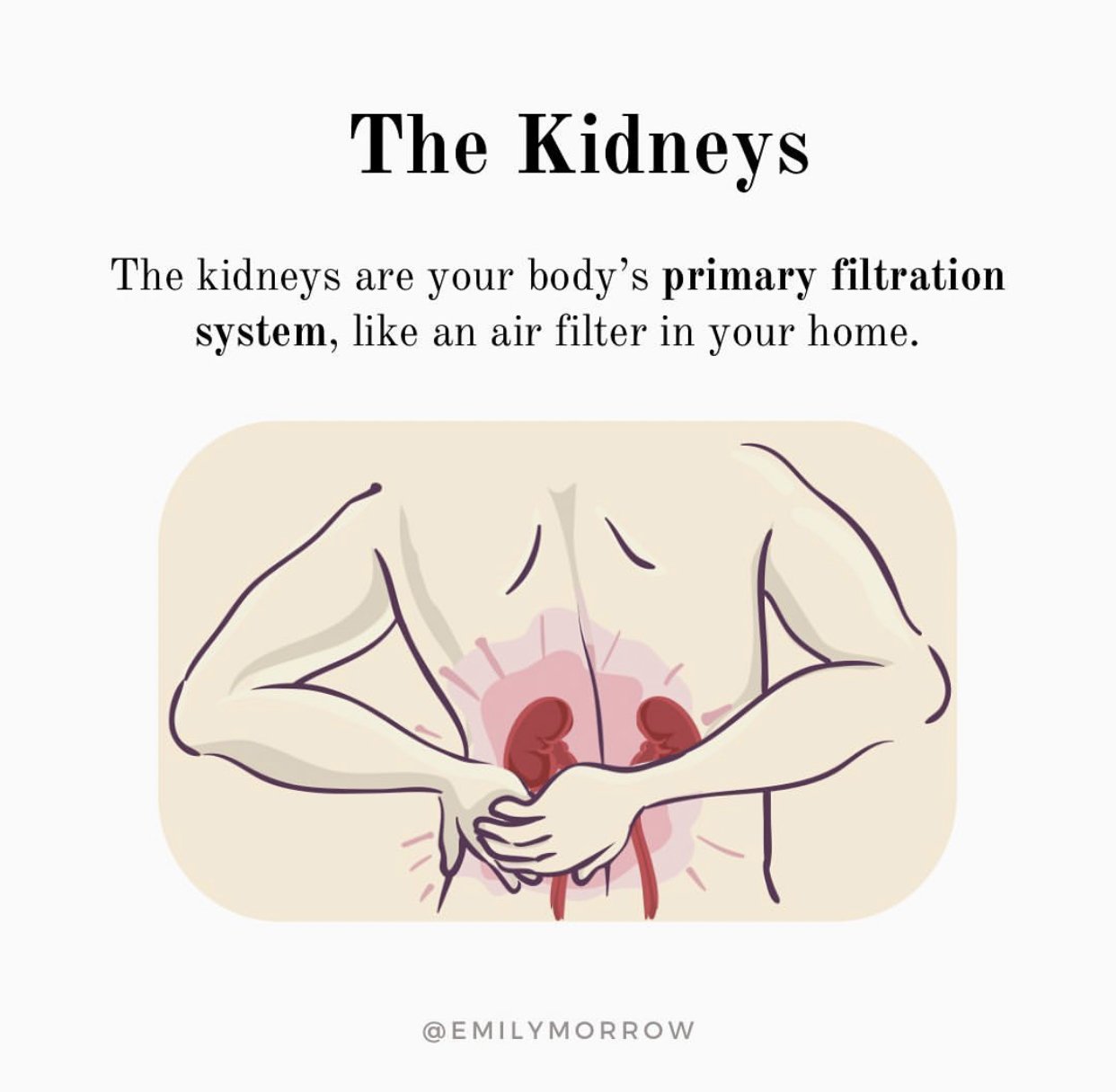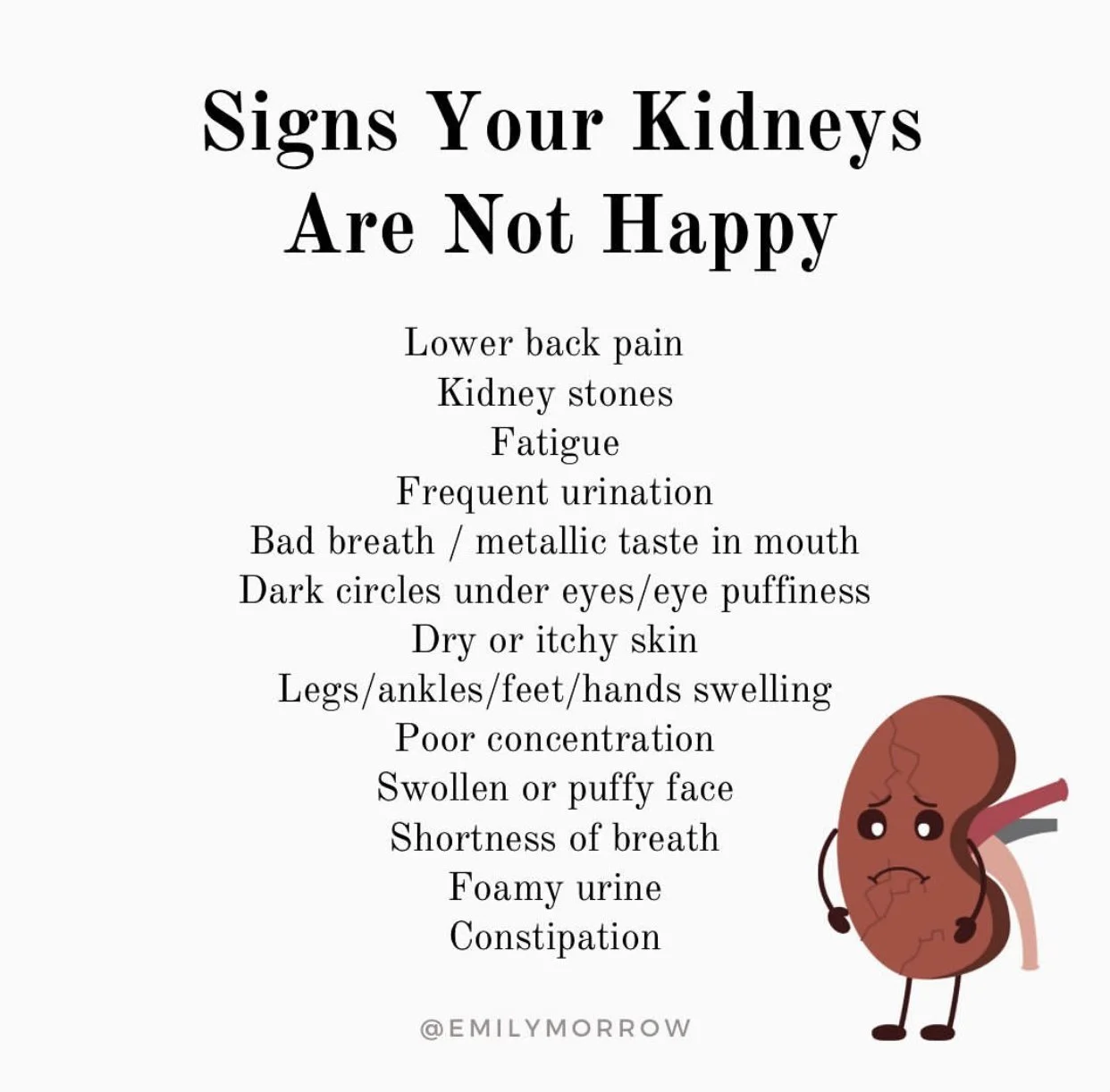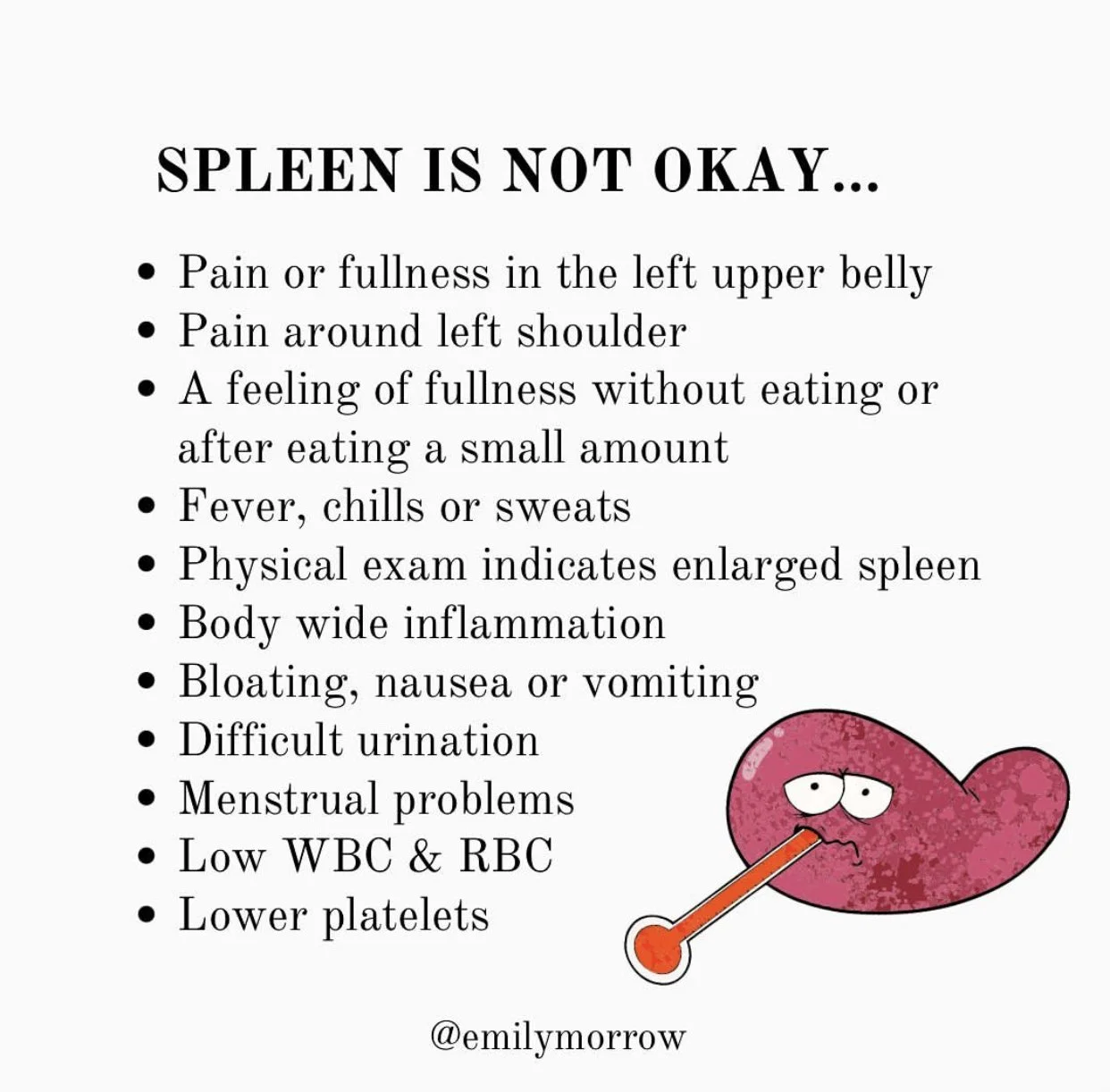The Kidneys: Roles, Signs of Dysfunction & Support
The Kidneys act as the bodies primary filtration system, to filter the blood and remove unwanted waste and toxins. The kidneys even cleanse themselves when the body takes in enough fluid. The kidneys rid the body of unwanted products of metabolism such as ammonia, urea, uric acid, creatinine, hormone metabolites, water-soluble toxins, heavy metals and more. They do a lot for you, so making sure they are in tip-top shape is important for not only filtration, but drainage and detox.
The Kidneys: The Primary Filtration System
In a perfect and normal situation, blood flows into the kidneys, where it is filtered and cleansed of excess fluids and waste products. After the blood is filtered, it returns to the blood stream, while the toxins are passed out of the body though the urine. Think of the kidneys like the air filter in your home. A good and clean air filter will trap the toxins and chemicals and poor air and let the good air through. This is needed for healthy air circulation in the home as well.
Many people will get plug in air filters for their home which yes, can clean up some of the air, but if the main system is backed up, it is like scooping water out of a boat with a leak in it. When there is too much waste in the blood paired with stagnant or impaired drainage from the other organ systems, like the liver or lymphatic system, overtime this lends way to poor kidney filtration and issues, and eventually damage.
“The kidney plays many important roles in maintaining health, ranging from activation of hormones to maintaining stable levels of key molecule in the blood to excretion of toxins. Most consider the kidneys second only to the liver in importance for toxin elimination. However, considering that 20% to 25% of cardiac output goes through these tiny organs, allowing them to filter the blood a remarkable 60 times per day, a case could be made that they are actually more important than the liver for toxin elimination. They rid the body of unwanted products of metabolism such as ammonia, urea, uric acid, creatinine, end products of hemoglobin metabolism, and hormone metabolites; toxins that have been made water soluble by phase 2 in the liver; and direct excretion of industrial toxins, such as heavy metals and a number of new-to-nature molecules. They also excrete nutrients or food constituents when consumed in excess, such as salt, vitamin C, B vitamins, and others.
One of the big challenges for the kidneys is that although they are effective at removing many toxins from the blood, some are difficult to then excrete into the urine. This means they accumulate in the kidneys and as their concentration increases, they can cause disproportionate damage to the kidneys. Cadmium illustrates this problem well.
Unfortunately, we are now exposed to such a high toxic load in the modern world that loss of function with aging—as can be seen in is considered “normal.” A 90-year-old has only one-third to one-half of the kidney function of a 20-year-old. This means a significant decrease in ability to rid the body of many toxins and helps explain why almost everyone becomes sicker with aging. Once again, “normal” is not healthy.” - Source
What Reduces Kidney Function?
Dehydration— most people are chronically dehydrated from not consuming enough water or not mineralizing it properly; when detoxing or health issues arise, the body often needs more water to flush out the toxins; the body also needs crucial minerals for this process as well
Heavy Metals— the kidneys are a major target organ in heavy metal toxicity since they tend to reabsorb metals; therefore, if people start detoxing and/or going on a parasite protocol and the kidneys are not optimized, those metals will impair kidney function; these metals come from our environment as well as within pathogens in the body; parasites for example act like a sponge for metals and toxins and chemicals, so if or when they die off, they can release everything into the system; this is why foundations and drainage are SO important in any detox process or day to day living (see wellness guide for more info on this)
“Heavy metals such as cadmium (Cd), mercury (Hg), lead (Pb), chromium (Cr) and platinum (Pt) are a major environmental and occupational hazard. Unfortunately, these non-essential elements are toxic at very low doses and non-biodegradable with a very long biological half-life. Thus, exposure to heavy metals is potentially harmful. Because of its ability to reabsorb and accumulate divalent metals, the kidney is the first target organ of heavy metal toxicity.” - Source
Mold & Mycotoxins— around 60-80% of kidney stones are actually calcium oxalate stones due to excess oxalate buildup in systems oxalic acid has the strongest affinity for calcium and secondarily, magnesium, depleting this very important and crucial mineral for over 300 enzymatic processes that most people are deficient in
Stress— uncontrolled stress leads to kidney issues due to its role in the blood pressure and blood sugar responses; imbalanced blood sugar or blood pressure will strain the kidneys and deplete magnesium and vitamin B6, both of which are needed to manage oxalate issues
Top 10 Favorite Kidney Supports
Hydration/Minerals/Healthy Diet— so important for proper kidney filtration; aim to drink filtered water, add minerals and consume alkaline rich foods with a variety of color; I love cherries for kidneys
Reduce Stress— look into breath work, sunshine, optimizing sleep, laughter, grounding, rest, reducing EMF load
Horsetail— for supporting kidneys, drainage and reducing metals*
Horsetail is a wonderful tonic for the kidneys. It gently increases urine outflow (a mild diuretic effect), but preserves the electrolytes — meaning it doesn’t deplete the minerals the kidney needs to function, like some diuretic medications do. It is commonly used in urinary tract infections, with kidney stone issues, or other urinary tract issues, like interstitial cystitis, bladder prolapse, chronic bladder infection/irritation, or urinary gravel (tiny, tiny stones that can be passed, but cause discomfort). Horsetail strengthens the mucus membranes of the urinary tract so they are less susceptible to irritation. It is mildly anti-inflammatory and antiseptic, so it is a natural choice for infections or inflammatory conditions.
B Vitamins (B6 is especially important)— for supporting kidneys, helping with the removal of heavy metals and reducing oxalates*
“Higher vitamin B6 intake might reduce urinary excretion of oxalate, one of the major determinants of risk for calcium oxalate kidney stones.” - Source
Magnesium— epsom salt baths, lotions and gels are great for absorption
Chanca Piedra— for kidney stones*
Uva Ursi
Reishi
Dandelion
Reduce Oxalate Load— Phosphatidyl Choline, Taurine, TUDCA all paired with a program based on your specific needs and root causes*
*A Doctor's advice should be sought before using any supplemental dietary product. These statements have not been evaluated by the FDA. This product is not intended to diagnose, treat, cure or prevent any disease. Individual weight loss results will vary.
A note on supplements: please do not buy just any ol’ supplements; ensure they are good quality, preferably from an online dispensary or specialty grocery store.
References & Further Reading:
Dietary oxalate and kidney stone formation
Lowering urinary oxalate excretion to decrease calcium oxalate stone disease
Vitamin B6 Intake and the Risk of Incident Kidney Stones
Effect of Heavy Metals on, and Handling by, the Kidney
The Kidney Dysfunction Epidemic, Part 1: Causes










